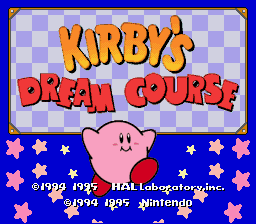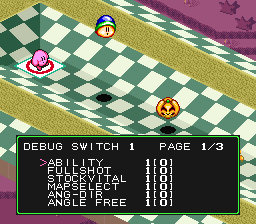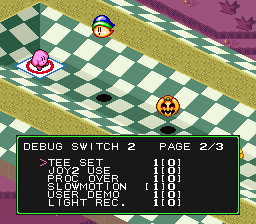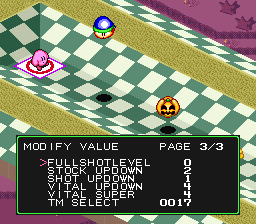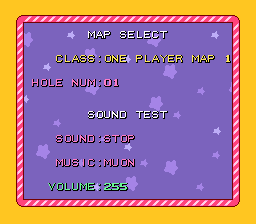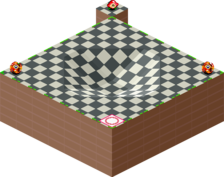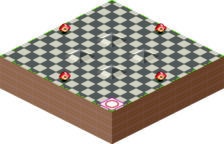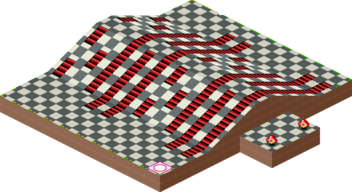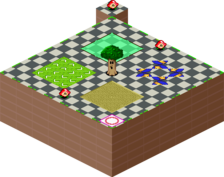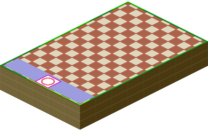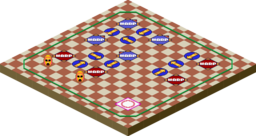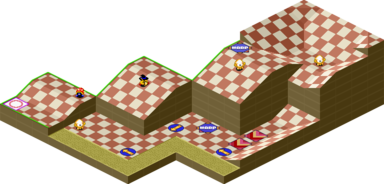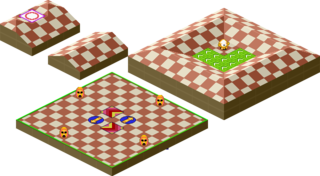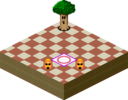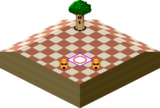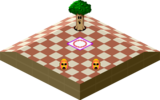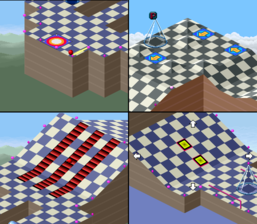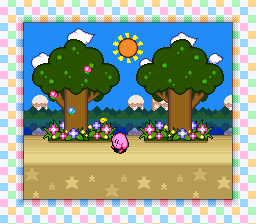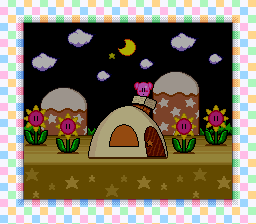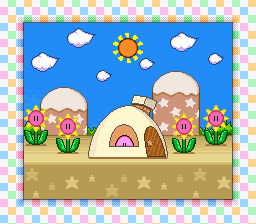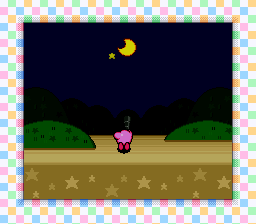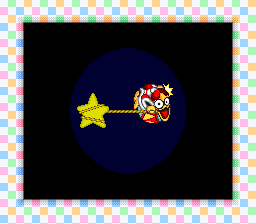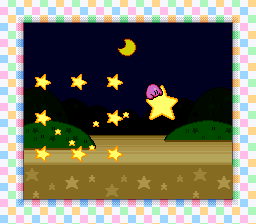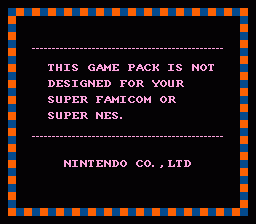Kirby's Dream Course
| Kirby's Dream Course |
|---|
|
Also known as: Kirby Bowl (JP)
|
Kirby's Dream Course is a mini-golf game, starring everyone's favorite pink windbag as the ball.
Contents
Sub-Pages
| Prerelease Info |
Debug Mode
Present only in the Japanese version. The patch below will allow you to access it by pausing the game and pressing X.
| Download Kirby Bowl (Debug Patch)
File: kirbybowl.rar (tiny) (info)
|
Most of the flags on pages 1 and 2 are no longer used. MAPSELECT has been fixed by this patch and replaces the normal course select screen with a stage select/sound test menu which can also be used to access some unused test maps (see below.)
What the values on page 3 do:
- FULLSHOTLEVEL - Probably meant for the (unused) FULLSHOT flag.
- STOCK UPDOWN - Adjusts lives counter (1P mode).
- SHOT UPDOWN - Adjusts number of shots taken on the current hole.
- VITAL UPDOWN - Adjusts number of tomatoes (can go over the usual max of 4).
- VITAL SUPER - Unknown.
- TM SELECT - Changes which graphic layers are visible on-screen.
Map Select
Setting the MAPSELECT flag to 1 will replace the normal course select screen with this menu, which serves as a combination map select and sound test.
"Class" selects a course. Pressing A goes to the selected hole, and pressing Y restarts the most recently played course. There are also four "EXTRA TEST MAP" courses which either load garbage maps or hang the game. Selecting any two-player courses allows you to play them in one-player mode.
For the sound test, pressing A plays the selected sound effect or music track, and L/R adjust the volume.
Curiously, the music track for the two-player menu is named NEXT HOLE in the sound test, while the track played when the scorecard appears after completing a hole is named COURSE 2P. This may indicate that the two tracks switched places at some point during development.
Unused Graphics
Mix Ability
![]()
There is an unused Mix ability icon in the game. Trying to hack it in as an ability will freeze the game. This might have been used once in the 2-Player mode after hitting the Mix enemy.
Unused Terrain
Tile type 03 is an unused terrain feature which consists of four downward slopes forming a "dimple" in the ground. It was likely intended to slow Kirby down over long-distance ground shots, but because of the way the game's physics works, coming to a near-stop inside the dimple will cause Kirby to endlessly roll back and forth without coming to a stop, making the game unplayable.
Rotating Tiles
Kirby's Dream Course has a total of 12 types of rotating tiles, spanning obstacle numbers 70 through 7B. However, only two of those (74 and 75) are actually used; these are the ones that are controlled by the on/off switch. The other types consist of:
- 70-71: tiles that always rotate even when the switch is turned off.
- 72-73: slow versions of 70-71.
- 76-77: slow versions of 74-75.
- 78-79: tiles that begin rotating when the switch is turned off, and vice-versa.
- 7A-7B: slow versions of 78-79.
| To do: I'm pretty sure at least some of these are present in Special Tee Shot, but I don't remember which ones. |
Test Courses
The Japanese version has a number of test courses remaining in the ROM! Twelve, to be precise! These aren't featured in any other release, with the course IDs instead pointing to empty versions of the King Dedede boss room.
On the map select screen, the first four test courses are listed under "Play Demo Map 3" (holes 5 through 8), while the last eight are listed under "Test Map".
Test Course 1
Used to test out different slopes and dips. The broken guardrails along the outer edges of the track are not connected properly, but still function if hit. This is an anomaly shared by the first four test courses, and are indicative of these maps being from the game's Special Tee Shot days (more on that later).
There are two Flamer enemies present, though using their Fireball abilities here is a particularly unwise idea unless you like flying off the course.
Test Course 2
Similar to the first, but with four small hills instead of a large depression and four standard Waddle Dee enemies.
Test Course 3
Used to test different conveyor belt lengths and directions on both flat and sloped surfaces. The first five conveyor belt strips move southwest, while the other five move northeast. It's possible to get stuck in an infinite loop if a conveyor belt pushes you onto an upward hill so that you roll back onto it.
Test Course 4
Seems to have been designed to test the different terrain and objects. The one-direction arrows are broken, and there's two boost tiles in the upper and left corners facing southwest, though they're invisible.
Test Course 5
This one uses the same layout as the King Dedede boss fight, but is completely empty and uses a different background and music. This is the first test course that is actually referred to as such by the level select and may date to an extremely early point in development.
Test Course 6
Designed to test the various warp tiles. This is also the first stage to feature correct borders and one-direction arrows, suggesting that it came after another point in the development of the game, after the game engine had been fully converted from Special Tee Shot.
Near the top left, one of the Warp tiles erases a one-direction arrow.
Test Course 7 (Early 8-3)
| Test Course 7 | Course 8-3 |
|---|---|
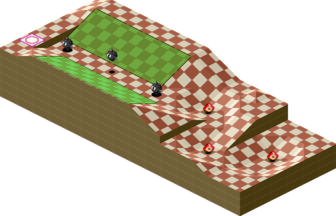 |
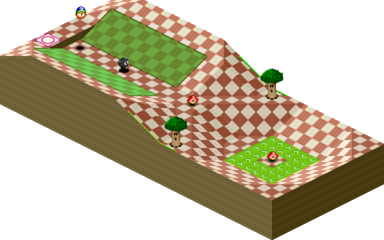 |
An early version of Course 8-3. The three Gordos were reduced to a single Gordo who alternates between moving southeast and northwest, and the three enemies in the final are a Gaspar near the start of the course and two Waddle Dees at the end. The latter half of the course was also changed significantly.
Test Course 8
Seems to have been created to test the Needle's ability to stick to slopes. It's also possible this was a discarded course, like Test Course 7.
Test Course 9
Seems to have been another possible course that was scrapped from the final game. It seems to serve no particular testing function, other than possibly jump shots onto slopes.
Test Courses 10, 11, and 12
Other than starting points, heights, and a minor geography change from 11 to 12, these courses are all small and relatively featureless.
Special Tee Shot Connection
There's some strong proof in the way Test Courses 1-4 function that gives them away as leftovers from Special Tee Shot.
Let's start with the scenery in Special Tee Shot: the objects it shares with Kirby Bowl are sandpaper, arrow tiles, conveyor belts, water, directional grass, and trampolines. Scenery it has similar versions of are dash tiles and stage borders. Objects that Special Tee Shot has no version of are spikes and warp tiles.
This helps to rule out certain test maps as Special Tee Shot leftovers. Test Courses 6 and 8 have warp tiles, so they can't be from Special Tee Shot, whereas Test Course 7 is an early build of a hole found only in Kirby Bowl.
On to the slightly different scenery. The dash tiles in Special Tee Shot don't just speed the ball up, but force the ball in a certain direction at top speed and the player loses control of the ball. While boosted, the ball can also climb up slopes and walls. Once the ball hits a stage border or an obstacle, the ball stops and the player regains control.
Test Course 9's dash tiles don't seem suited for this purpose, plus they're using the 2×2 tile graphics instead of the 1×1 graphic of Special Tee Shot, so this rules Test Course 9 out. Test Course 4, however, does have 1×1 dash tiles, and they don't use any part of the Kirby Bowl dash tile graphics.
The stage borders in Special Tee Shot are invisible until hit by the ball, being marked only by floating spheres in between. In Kirby Bowl, they're always visible and completely solid in form. This points towards Test Courses 1-4 being from Special Tee Shot and Test Courses 5-9 being from later in development (where Test Courses 10-12 fall is uncertain, but probably the latter). The enemies present in Test Courses 1-4 were very likely added after the conversion so the maps could be completed, whereas Special Tee Shot involves simply getting the ball into a hole which is always present on the course.
The most substantial evidence is how the arrow tiles are stored in RAM:
| Special Tee Shot | Kirby Bowl |
|---|---|
Note how the orientation of the graphics has been flipped between Special Tee Shot and Kirby Bowl. In Special Tee Shot, the bottom comes before the top, and the arrow is pointing to the top-right. In Kirby Bowl, the top comes before the bottom, and the arrow points to the top-left.
![]()
This is how the arrow tiles are positioned in Test Course 4.
![]()
If the arrow graphic order in Kirby Bowl is changed to be bottom-top, as in Special Tee Shot, the arrows look correct, but are pointing in the wrong direction.
![]()
Flipping the graphics as well, to match Special Tee Shot, makes them point in the correct direction. This is the end result after effectively restoring the Kirby Bowl tiles to how they were in Special Tee Shot, proving that this course was made before the conversion to Kirby Bowl.
Regional Differences
For the international release, a decent amount of content was removed to fit the ROM into a 8 megabit cartridge, in contrast to the Japanese version which uses a 10 megabit cartridge. This includes a debug menu and Test Courses 1-4 & 6-9 (as detailed above), plus the following:
Title Screen
Besides having a completely different title screen, the Japanese version also has a short animation of Kirby popping up from the hole. A short "music" track accompanies this, and is still present in the international versions as Track 02.
| Japan | International |
|---|---|
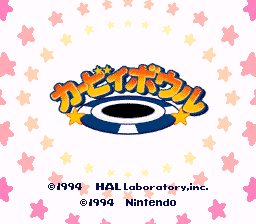
|
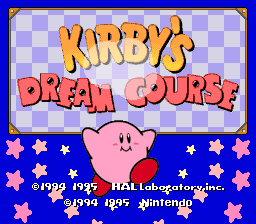
|
Introduction
This game has an introduction story, but only in the Japanese version. This was relegated to the instruction manual of the international releases. It also includes a music track (ID 05 in the original version) played during the story cutscene, which is not present at all in international builds.
| Introduction (Japanese) | Introduction (translated) |
|---|---|
| ちいさなほしの ちいさなくに ここは へいわな 「プププランド」
きょうも カービィは のんびり のんびり へいわなひびを おくっています そんな あるひの ある よるのこと 「こんやも ほしたちを ながめながら すてきなゆめを みようかな」 「おやっ?」 なんだか ようすが へんです いつもなら たくさんの ほしたちが きらきら かがやいて いるのですが こんやは ほしが たったひとつしか でていないのです そのときから とてもさびしい よるが なんにちも つづきました カービィは いなくなった ほしたちのことが しんぱいで こんやも よぞらを みています 「あっ!?」 そのときです 「ウシシシ まだひとつ のこっていたぞ」 あの「デデデだいおう」が さいごのほしを さらっていくところを みつけました 「プププランド」の よぞらに きれいなほしたちを とりもどすため カービィは 「デデデだいおう」の あとを おいかけるのです めざすは てんくうにうかぶ だいおうの しろ がんばれカービィ! |
A small country on a small planet, this is the peaceful "Dream Land".
Today, Kirby is living his leisurely, carefree life. Then, that night... "I wonder if I'll have another wonderful dream tonight, gazing up at the stars" "Huh?" Something seemed odd. Usually there were many stars twinkling brightly in the sky. But tonight, only one of the stars had appeared. From then on, those lonely evenings continued for many days. Kirby, worried about the missing stars, stares at the night sky once again. "What?!" Just then... "Nyehehehe! There was one left!" He caught King Dedede stealing the only remaining star. To restore the beautiful stars to Dream Land's night sky Kirby takes off after King Dedede. Your goal is to get to the King's floating castle. Good luck, Kirby! |
Controller
| Japan | US | Europe |
|---|---|---|

|

|

|
The button colors on the standard controller change for the US version. The European version keeps the button colors from the Japanese version, but removes the text from the controller.
| International | US |
|---|---|
The same button changes, even though the US controller doesn't really use the appropriate color scheme.
Copy Protection
Kirby's Dream Course and Kirby Bowl feature a multi-level copy protection feature which is similar to the well-known one present in EarthBound, another game developed by HAL during the same period of time.
Region / SRAM Check
First, the game tries to detect the amount of SRAM on the cartridge. If the amount is greater than 8kb, indicating a copier or other illegitimate cartridge, the game will display the below warning.
| Kirby Bowl | Kirby's Dream Course |
|---|---|
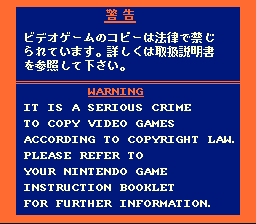 |
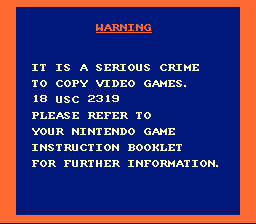 |
In addition, as is common to many other SNES games, if a North American or Japanese cartridge is being played on a European console or vice-versa, this region lockout screen will be displayed.
Other Effects
If both of the above tests pass, the game also performs a checksum on the code that handles those checks to see if they have been modified. If the checksum fails, the game will still boot normally, but will become virtually impossible to actually play:
- When you hit an enemy or clear the hole, you don't regain any tomatoes. You also don't get 1-Ups from Hole-in-Ones.
- When you recover from sleep in a two-player game, you only regain one tomato instead of the normal amount of four.
- When you inevitably get a Game Over, all save data is erased upon selecting "Game End" and the "Continue" option cannot be selected.
- If you do somehow manage to complete an entire course this way, once you reach the final score screen, all save data is erased and the game intentionally crashes.
The last of the above effects is especially nefarious, because it has its own checksum routine in addition to the normal one - if the first checksum passes, the second checksum makes sure the first checksum wasn't tampered with, in case one tries to bypass the first three effects.
The Pro Action Replay (PAR) code 81801A00 or Game Genie code DD6F-4460 will enable the above four effects, if you want to see for yourself.
Side Effects on Gameplay Demos
Some of the gameplay demos also operate differently in a pirated copy of the game. This may be related to the lack of tomato recovery mentioned above; when Kirby is low on tomatoes, he goes through a tired animation before the player can make the next shot. The recorded inputs for certain demos don't take this into account and get desynced whenever Kirby gets tired, causing subsequent actions to not be executed correctly.
For the "Needle's Power" demo, the game will launch Kirby straight in the void on the final shot, rather than lobbing him into the hole. This triggers a Game Over, but the player will not be able to select "Continue" at the end. They can still select "Game End" though. The Select button still allows the player to go back to the demo selection menu.
In the "Objects" demo, Kirby does nothing for the final shot, forcing the player to press "Select" to return to the demo selection menu.
The second gameplay video upon waiting on the title screen is also different; Kirby takes a really long time to do anything. Not only that but he will eventually take a shot out of bounds and then stay motionless after doing his final shot. Pressing any button on the controller returns the player to the title screen.
- Pages missing developer references
- Games developed by HAL Laboratory
- Pages missing publisher references
- Games published by Nintendo
- SNES games
- Pages missing date references
- Games released in 1994
- Games released in September
- Games released on September 21
- Games with unused areas
- Games with unused graphics
- Games with unused abilities
- Games with unused music
- Games with debugging functions
- Games with hidden sound tests
- Games with hidden level selects
- Games with regional differences
- Games with anti-piracy methods
- To do
- Kirby series
Cleanup > Pages missing date references
Cleanup > Pages missing developer references
Cleanup > Pages missing publisher references
Cleanup > To do
Games > Games by content > Games with anti-piracy methods
Games > Games by content > Games with debugging functions
Games > Games by content > Games with hidden level selects
Games > Games by content > Games with hidden sound tests
Games > Games by content > Games with regional differences
Games > Games by content > Games with unused abilities
Games > Games by content > Games with unused areas
Games > Games by content > Games with unused graphics
Games > Games by content > Games with unused music
Games > Games by developer > Games developed by HAL Laboratory
Games > Games by platform > SNES games
Games > Games by publisher > Games published by Nintendo
Games > Games by release date > Games released in 1994
Games > Games by release date > Games released in September
Games > Games by release date > Games released in September > Games released on September 21
Games > Games by series > Kirby series
